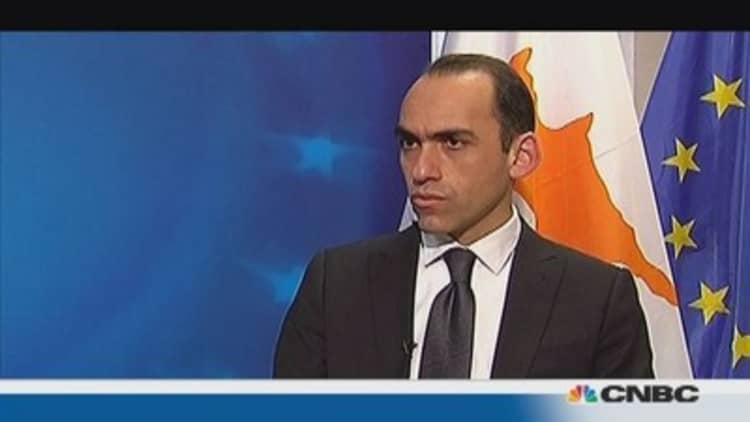Last week, a soccer match between the U.S. and Ukraine was moved from the latter's capital to Nicosia in Cyprus due to the recent unrest in Crimea.
The match in the safer location of Cyprus stands in stark contrast to the events of this time last year, when all eyes were on the unfolding financial and social crisis on the Mediterranean island.
After Cyprus, a member of the 18-country euro zone, admitted that it could no longer afford to prop up its shaky banking sector, international lenders stepped, offering 10 billion euro ($14 billion) in assistance.
But by far the biggest slice of the country's 23 billion euro bailout had to come from Cyprus itself. After chaotic negotiations with euro zone finance ministers, the European Central Bank and the International Monetary Fund, a so-called 13 billion euro "bail-in" was agreed. It proved to be controversial, with shareholders and bondholders bearing some costs of restructuring, including a levy on uninsured bank deposits over 100,000 euros ($136,000).
(Read more: )
Authorities also imposed restrictions on bank transactions in an effort to avoid savers in the country's banks immediately withdrawing their money - the last of which will be removed this spring.
"If you take a longer-term view and a Europe-wide view, I think that it was a disastrous thing for them to do because they undermined confidence in entire euro zone structure," Christopher Pissarides, a Noble Prize winning economist and chairman of the Council of National Economy of Cyprus, told CNBC.
One year on, and Cyprus is not entirely avoiding the headlines.
Central Bank Governor Panicos Demetriades resigned earlier this week after a tumultuous year, and last Tuesday the island's parliament approved a bill to privatize number of state-owned companies – one of the conditions of the aid package – just days after it had rejected an earlier version.
(Read more: Cyprus central bank governor resigns)
Cyprus moves on
But despite some news from theisland, there are certainly less cameras on the streets of Nicosia: last March the Cypriot capital was flooded with journalists.
As news of the bank controls emerged, savers rushed to the country's banks to try and get to their savings. International concern increased that the country could fall victim to social unrest.
"They were waiting to see the riots and strikes in other bailout countries, and it never happened," said Parker Williams, a Brit who lives in Cyprus and writes about the country for expat website CyprusExpat.co.uk.
Economist Pissarides agreed. "There has been nothing as serious as we have seen in Greece. We are much closer to Ireland than we are to Greece in how we are dealing with the troika (of international debt inspectors)," he said.
Preliminary data released Tuesday showed Cyprus remained in recession in the fourth quarter of 2013, but the rate of contraction slowed. Cyprus' economy shrunk by 0.8 percent in the fourth quarter of 2013, slightly up from the 0.9 percent drop in the third quarter.
According to Eurostat data, unemployment in Cyprus was at 16.8 percent in January, while youth unemployment reached 40.3 percent.
(Read more: Economy more resilient than expected: Cyprus Minister)

Pissarides stressed that the country's economy had performed better than many expected.
"There is still going to be negative growth this year, but the things that have been done so far have been positive," he said. "Like recapitalizing the banking sector partly,relaxing some of the constraints in capital movements and satisfying all the MOU (Memorandum of Understanding) requirements up to this point, including privatization."
But David Lea, Control Risks' senior Europe analyst, told CNBC that public anger at the privatization bill would likely re-emerge.
"The passage of the bill calms things down for now, though I'm still expecting the workers from the Electricity Authority of Cyprus (EAC) and Cyprus Telecommunications Authority (Cyta) and the other state-owned enterprises to keep protesting in the coming weeks," he told CNBC.
Bank of Cyprus' linger doubts
The country's main issue now, according to Pissarides, is with the epicentre of last year's crisis: Bank of Cyprus and its vast amount of non-performing loans (NPLs) and requires substantial recapitalization.
"They have to decide what to do about the NPLs," he said. "When there are so many… you cannot just go and sell them all -- there would be a massive crash in property prices and social unrest. So the Bank of Cyprus is trying to work out a way to get back some of their money without creating more social and economic problems."
One interesting development following last year's bail-in is that Russians are now some of the country's banks' biggest shareholders. Many Russians had used the island as something o fa tax haven, and when the Cypriot government seized deposits last year, part of that money was converted into bank shares.
For Williams, this is no bad thing.
"The Cyprus people know that the Russians are on board at the Bank of Cyprus," he said. "The gravy train has stopped: no more getting loans, without the intention of ever paying them back."
But for Pissarides, one year on, the ramifications of the bail-in are less clear cut.
He said that although the Bank of Cyprus' Russian shareholders had not caused problems yet, "they are such a big minority you think they would be able to block some decisions… We have to wait and see what will happen."
—By CNBC's Kiran Moodley. Follow him on Twitter @kirancmoodley

